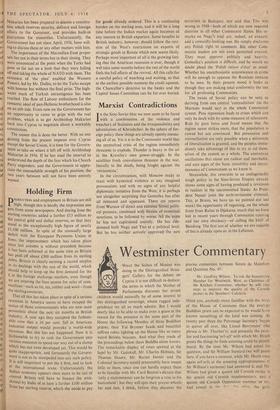Marxist Contradictions
N the Sino-Soviet bloc we now seem to be faced 1 with a combination of the violence and treachery of Stalinism and the irresponsibility and adventurism of Khrushchev. In the sphere of for- eign policy these things are already openly menac- ing all of us. Yet it is in the Communist world that the unresolved crisis of the regime immediately threatens to explode. Thunder is heavy in the air in the Kremlin's own power-struggle. In the satellites fresh convulsions threaten in the war, literally to the death, being fought against the 'revisionists.' In the circumstances, with Moscow ready to react with hysterical violence at any imagined provocation, and with no signs of any helpful diplomatic initiative from the West, it is perhaps not altogether surprising that Gomulka has after all retreated and appeased. There are reports from Warsaw' of direct and extreme Soviet politi- cal pressure, combined with threats of economic sanctions, to be followed by worse. All the same he has not capitulated entirely. He has con- demned both Nagy and Tito at a political level. But he has neither actively approved the new terrorism in Budapest, nor said that Tito was wrong in 1948—both of which are now required doctrine in all other Communist States. His re- marks on Nagy's trial are, indeed, an evasion. and a cowardly-looking one. He simply disclaims any Polish right to comment. But other Com- munist leaders are not even permitted evasion. They must approve publicly and heartily, Gomulka's position is difficult, and he would no doubt plead the 'Polish raison (Pete as usual. Whether his unenthusiastic acquiescence in crime will be enough to appease the Russians remains to be seen, in their present mood it looks as though they are making total conformity the test for all professing Communists.
The twists of Soviet policy can be seen as deriving from one central 'contradiction' (as the Marxists would say) in the whole Communist system. Pure repression leads to crises which can only be dealt with by some measure of relaxation. Rule by pure force and fraud means that the regime never strikes roots, that the population is cowed but not convinced. But persuasion and reconciliation are only possible when a minimum of liberalisation is granted, and the peoples imme- diately take advantage of this to try to rid them- selves of the system as a whole. The convulsive oscillations that ensue are radical and inevitable, and sure signs of the basic instability and impzr- manence of Communism as we know it. Meanwhile, this reversion to an undisguisedly tough policy in the Sino-Soviet Empire already shows some signs of having produced a revulsion to realism in the uncommitted States. As Presi- dent Nasser ' joins the arch-revisionist criminal, Tito, at Brioni, we have (as we pointed out last week) the opportunity of regaining, on the whole front from Rabat to Djakarta, much that we have lost in recent years through Communist cunning and our own obstinacy—of calling the bluff of Bandung. The first test of whether we are capable of this is already upon us, in the Lebanon.






















































 Previous page
Previous page